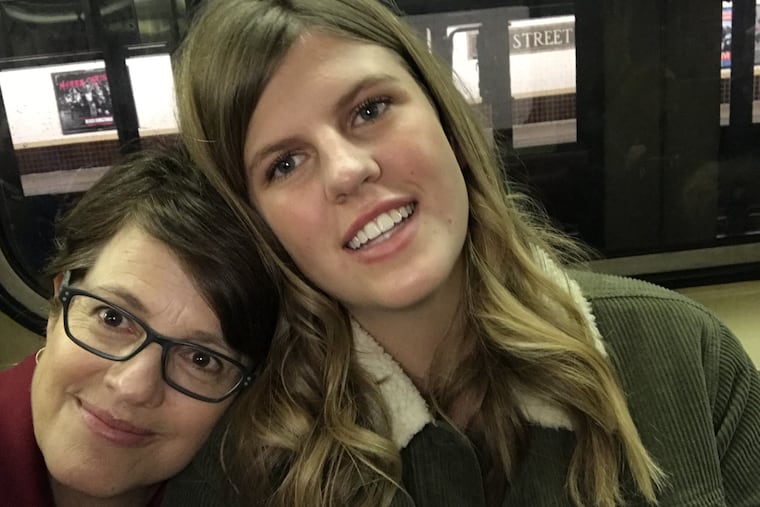My kid cares about climate change. So I showed her I do, too.
I cut out coffee pods, composted, and ate fewer burgers. I liked driving my very cute Mini Cooper with the sporty stripe, but I love the way my kid looks at me when I plug in my electric vehicle.

The day the Supreme Court handed down its decision limiting the regulatory power of the Environmental Protection Agency over power plants, I was reminded of a very hard conversation I had a few years ago. A young woman who I’ve always thought would make a terrific mom told me, “I’ll never have kids. Not if we aren’t going to fix the climate.” I challenged her, first with my expression of total disbelief and then with a word. “Really?”
“Really,” my daughter Claire told me.
Claire is one of hundreds of thousands — if not millions — of young people who foresee 120-degree summers followed by fire seasons that have made us all too fluent in air quality index and come to ask: What kind of life is that?
Importantly, impressively, those same teens immediately ask another question: How can I help?
While visiting her grandparents in Iran, teenager Sophia Kianni found herself trying to explain why the air around them had become visibly smoggier over their lifetimes. Her family members were disturbed by the obvious pollution but also confused. She went online to pull up primers, but basic climate research wasn’t available in Farsi. So, during the pandemic, she and her sister had some fun on TikTok translating climate science into Farsi. The next thing she knew, she was using the platform to call for more translators for more languages. She received over 1,000 replies.
Rahul Durai is a 16-year-old with a long document outlining legislation he’d like to see the Indiana state legislature adopt, creating a climate and environmental justice task force. After much legwork, he recruited eight cosigners: four Democrats, four Republicans. When he’s not calling state politicians asking for a face-to-face meeting (they generally don’t respond until he’s left a dozen messages or more), he’s going to PE or cleaning his room.
» READ MORE: Climate change is a parenting issue
I knew Claire and her generation protested, posted online, and wore tie-dye shirts on Earth Day. But until Claire told me she wasn’t planning to have children, I hadn’t appreciated just how much climate change was weighing on her generation. It’s not just Claire: A recent survey of 10,000 people aged 16-25 living in 10 countries found that nearly 40% were hesitant to have kids due to global warming.
It was time for me to listen harder, and it was time for me to step up.
I set about to produce a podcast series featuring teenagers and climate scientists talking about what is happening now. On one episode, Claudia Benitez-Nelson, an oceanographer at the University of South Carolina, highlighted the almost singular impact our children can have on us. Maybe the best person to get, say, Shell to shift from fossil fuel to green energy is not a court in the Netherlands (it’s been trying) or Shell shareholders or another U.N. resolution. Maybe it’s one of the CEO’s four children, who wants their parent to make hard choices for a better-shared future.
Sophia and Rahul (and the children of the fossil fuel executives) are asking us to stop admiring the problem from a distance. They’re asking us to match their passion with our power to make the moves, finally, that only we can make: installing solar panels, adopting electric vehicles, and reducing air travel. They’re asking us to exercise our influence at our companies, in our neighborhoods, and at the voting booth.
To love a person is to care about what they care about. I’ve known this since my dad took an interest in springboard diving the summer I discovered I could do a reverse pike. Now it’s my turn to show my daughter that if something is important to her, it’s important to me.
To love a person is to care about what they care about.
She was home this summer from college, and a daily witness to my decisions to act — or not act — as a climate-aware citizen. Every day, I tried to adjust my behavior to integrate what she’d been teaching me. It wasn’t always easy.
I love a grilled burger in the summer, but thanks to those damn cows — and their billowing methane — I only had one. Though the coffee I used to make from a single-cup machine tasted better and was always the right temperature, I don’t use coffee pods anymore because Claire pointed out that they’re hard to recycle, so most of the capsules end up in a landfill. Composting is a hassle and sometimes a little gross, but I have come to crave the mission alignment within my family when I drop a new biodegradable bag into the bamboo bucket on our kitchen counter. I liked driving my very cute Mini Cooper with the sporty stripe, but I love the way my kid looks at me when I plug in my electric vehicle.
Claire is back in school now. Unobserved, I find the moves have become habitual, not to mention a quiet way to connect with my far-away child. I made these changes not because I want grandchildren (although I do); I did it to show my daughter I got the message, and I’m on her team — the team of the future.
Kelly Corrigan is the author of four New York Times bestsellers and the host of the radio show “Kelly Corrigan Wonders” on WHYY, as well as the PBS interview series “Tell Me More,” also on WHYY. The new season airs Wednesdays at 7:30 p.m. starting Oct. 12.